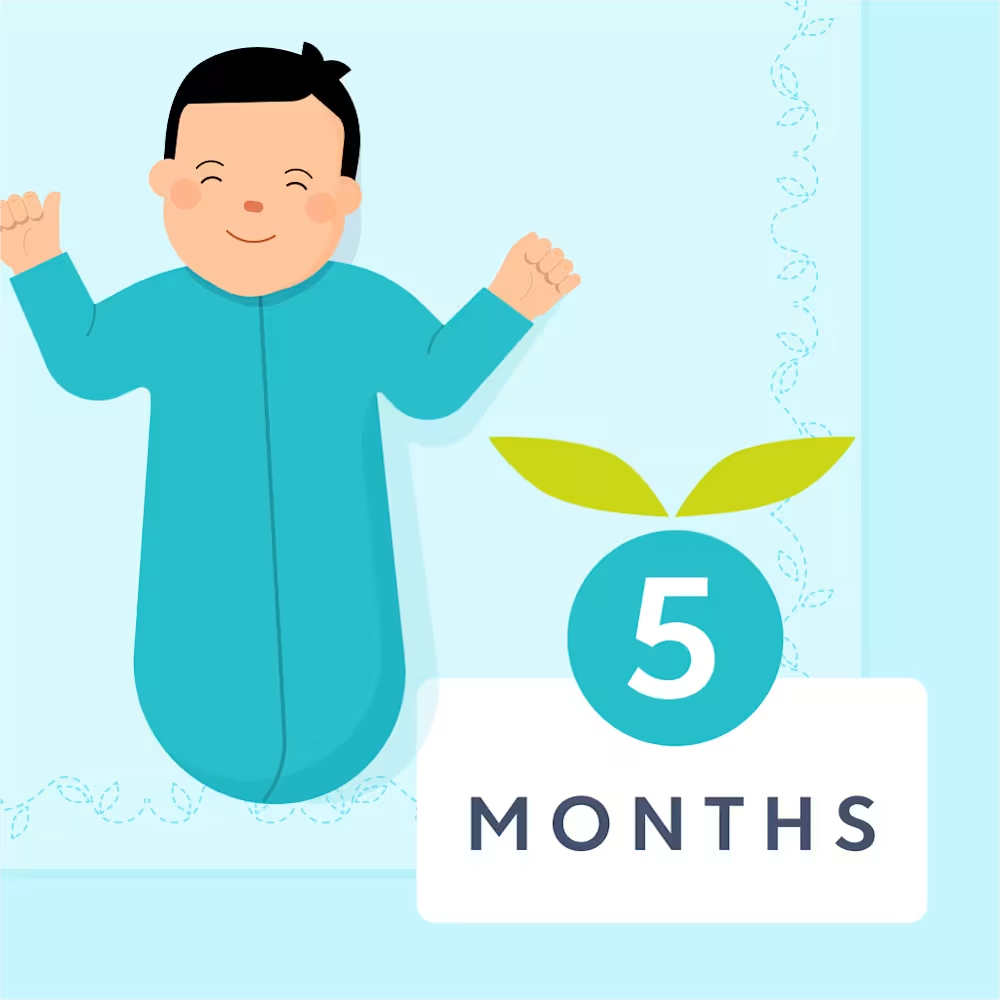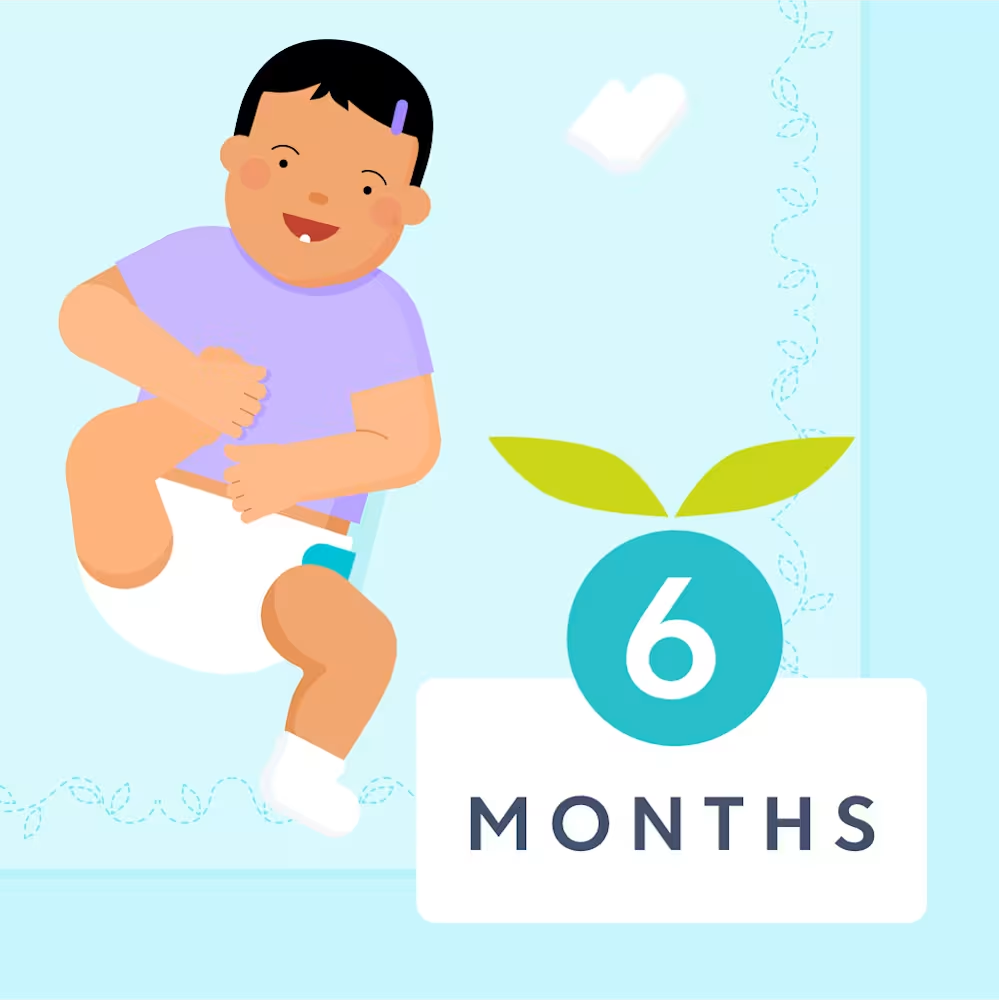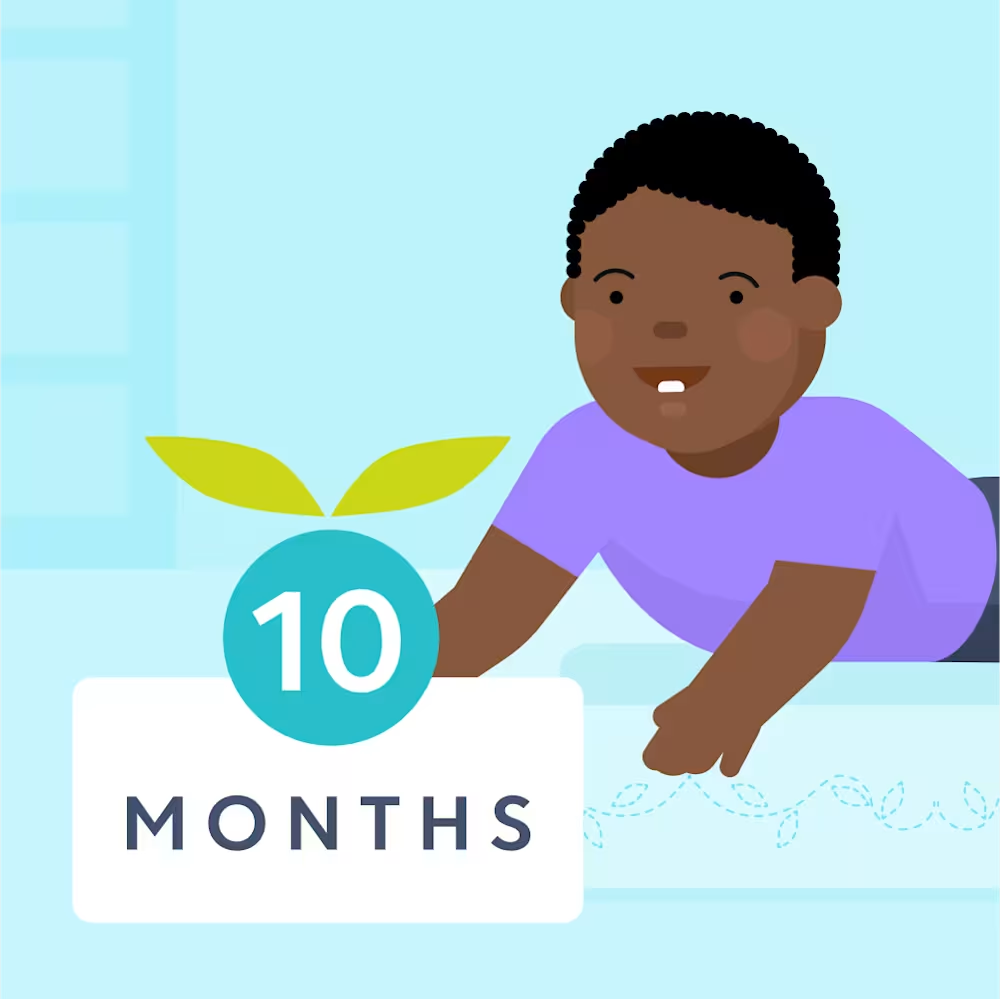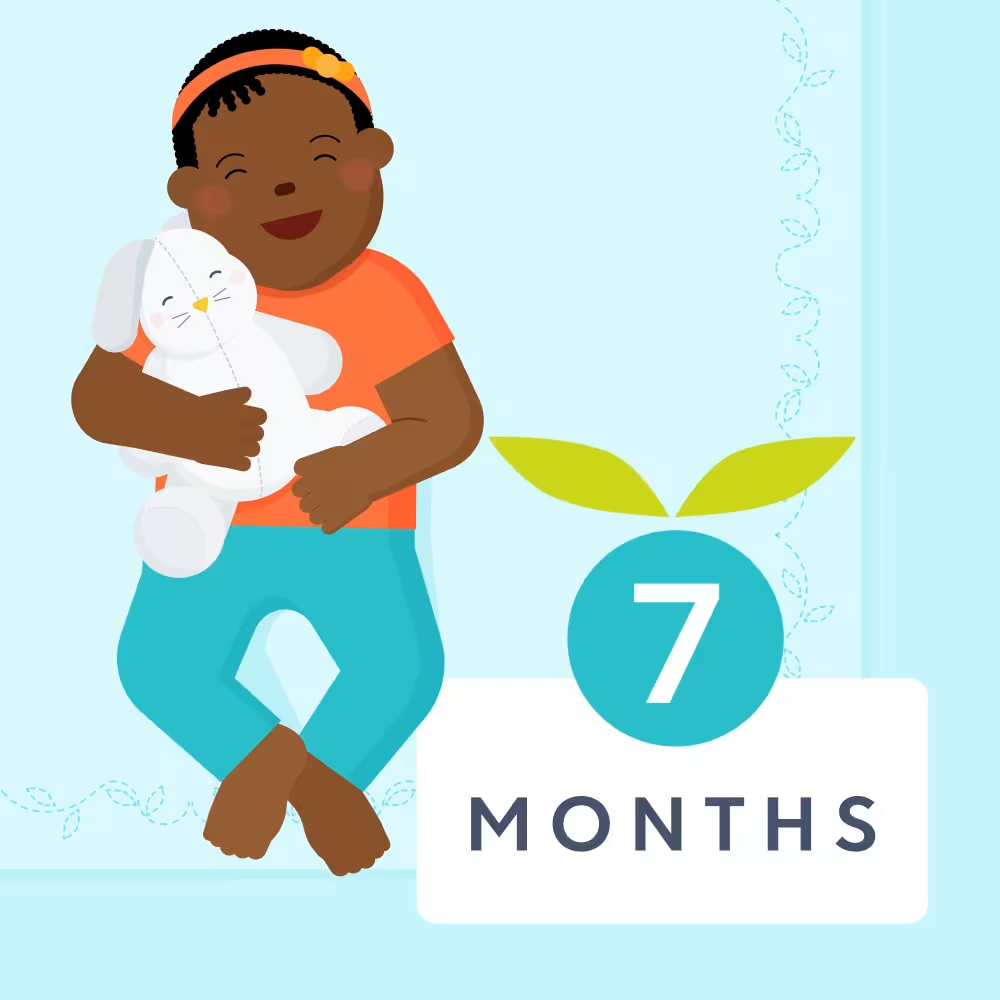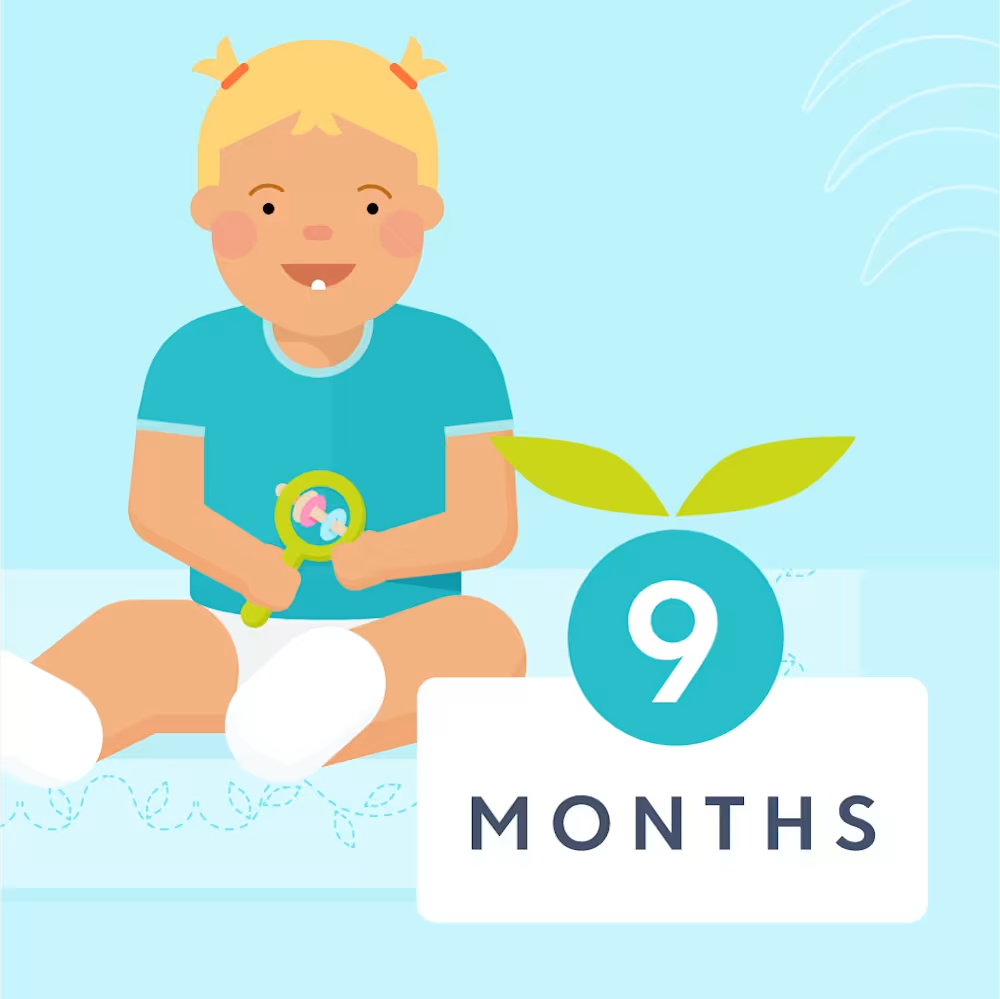Baby wake windows by age: Newborn and infant sleep windows
Updated Dec 29, 2025

“In like a lion, out like a lamb.” It's a saying often used to describe the weather in March. But it’s also an apt description of a baby's sleep patterns over the first year. Expect your baby’s sleep to be a bit wild during the newborn period — i.e., irregular sleep times and durations. By their first birthday, however, your baby’s sleep will have calmed down, becoming more predictable with fewer sleep disruptions.
What are wake windows?
Wake windows refer to the amount of time a child can comfortably stay awake between sleep periods. Over each stretch of awake time, homeostatic sleep pressure builds up and then helps drive a baby to sleep again. It’s expected that wake windows will increase over a child’s first few years of life, as they grow and develop. For example, a newborn baby will likely only be able to comfortably stay awake for around 30 - 90 minutes, while a 4 month old baby’s wake windows may be somewhere around 1.5 - 2.5 hours. A 12-month-old can typically stay awake for 3 - 4 hours!
Wake windows factor into how many naps your child will take per day. Since newborns have very short wake windows, they’ll need lots of naps each day, whereas an 8 month old can stay away much longer and typically needs 2 - 3 naps per day. In general, as wake windows lengthen throughout your baby’s first year, the number of naps they’ll need will decrease. More awake time = fewer naps.
Also, keep in mind that it’s OK if your little one’s wake windows fall outside of these guidelines. They’re just that: guidelines. Every baby is different, and some children need more or less sleep. Paying attention to your child’s overall mood and energy levels is also important when evaluating if they’re getting enough sleep.
Sleep patterns in the first year
Here’s a quick snapshot of what to expect during the first year.
[Note: for children who were born early, we go by their adjusted age for sleep development.]
Newborns 0 - 2 months
We’ll be honest: newborn sleep is best described as chaotic. Daytime sleep can range from micro naps of 10 minutes to several hours long. Bedtime will be inconsistent and you’ll need to attend to their needs throughout the night.
We promise your baby’s not trying to be difficult; their biological sleep processes just aren’t fully formed yet. Their circadian system, aka the internal clock (which governs sleep-wake rhythms), is underdeveloped and will progressively mature over the next few months [].
Don’t expect your baby to be ready for an early bedtime quite yet. In fact, your baby’s days and nights might be reversed at first. If so, don’t panic. Day-night confusion [] (when a baby sleeps more during the day than at night) is common but should resolve after the first two months.
Infants 3 - 5 months
Good news! Before you know it, sleep will become more regular, though not quite predictable. By 12 weeks old, your baby will produce enough to help regulate the timing of bedtime. That means you can expect a fairly regular (and earlier) bedtime to emerge.
Sleep cycles also mature at around 3 months [], giving your baby sleep cycles similar to an adult, rather than a newborn. Don’t be alarmed if your little one suddenly starts waking more during the night. This maturation can lead to changes in sleep patterns, which is often referred to as the “.”
This is a great time to institute consistency in their bedtime and nap routine if you haven’t already. Consistent routines [] are great for helping babies transition from playtime and cue that it is time to sleep.
Infants 6 - 8 months
Craving more predictability? You’ll start to get it during this timeframe, now that internal sleep processes have matured and sleep periods have lengthened.
That said, there’s still one hitch. While many babies still need a third nap of the day, it won’t always happen. This often results in parents having to choose between a too-early bedtime or a very overtired child. Most babies drop their third nap by 8 months (or are, at least, in the midst of the).
Don’t be discouraged if you’re attending to your baby once or twice a night. It’s still common for babies to continue to need some assistance during the night.
Infants 9 - 12 months
That unicorn — predictable baby sleep — arrives for many by this age. Most babies are reliably on a which can make it much easier to schedule activities outside of the home. More good news: expect fewer calls for help during the night. Research shows that babies will continue to consolidate night sleep until 12 months [] of age.
While the schedule part may get easier, babies are also becoming more mobile during this stage. Your baby may be crawling, pulling up to stand, and/or walking. These developmental milestones are so exciting! Yet, they can impact sleep too.
It’s a lot easier to lay your baby down to sleep if they aren’t constantly popping up to practice their cruising in the crib. If this is a challenge, ensure your baby has plenty of practice time during awake periods.
You’ll also want to make sure that your baby is sufficiently tired for bedtime. An awake period that is too short or too long can make bedtime more difficult too. Luckily, our can help parents take the guesswork out of wake windows.
When is it time to adjust your baby's wake windows?
You may be wondering how to know when it’s time to adjust your little one’s wake windows. Keep in mind that the age-based wake windows are guides — and not exact — so there’s no set time when wake windows should be increased for every child. In addition to keeping age-appropriate wake windows in mind, there are some other factors that may indicate your child can comfortably stay awake longer.
Some indicators that your little one may need a schedule adjustment include:
Resisting naps/bedtime
Short or skipped naps
Child doesn’t seem tired at sleep times
Note that other factors (illness, travel, teething, milestone mastery, etc.) may also impact sleep so consider whether these issues are contributing to sleep challenges before making a schedule adjustment. Plus, adjusting a wake window doesn’t have to be a drastic, sudden change — sometimes even an additional 10 - 15 minutes can make a difference in helping your child fall asleep and get the rest they need. Gradual changes are OK too!
If you’d like to take some of the guesswork out of infant wake windows, Huckleberry’s SweetSpot sleep predictor can help you find optimal nap and bedtimes, even if your child is in the midst of a nap transition.
How long should you monitor your baby's wake windows?
Wake windows can be a useful tool over the first year of your little one’s life, especially in the first 6 months. Keeping tabs on and wake windows for babies are both helpful ways to determine when your infant may need some shuteye.
However, by 6 months your baby’s sleep-wake cycle will be governed in large part by their internal clock [] too, instead of primarily by sleep pressure. This change means
parents may consider using more of a “by the clock” schedule for their child, where naps and bedtime are dictated by the time of day instead of solely by wake windows. This can help regulate a child’s schedule and lead to more predictability.
Note that while age appropriate wake windows should be considered when determining set nap times and bedtimes, the sleep times would not fluctuate day to day. In other words, the schedule stays the same even if a kiddo wakes early or a nap is short on a given day. This type of schedule may work best for children 6+ months or once your little one has transitioned to two naps.
Your baby’s sleep schedule in the first year
Sleep schedules for newborns 0 - 2 months old
In general, expect your newborn to sleep a lot (an average of 16 - 17 hours of sleep in a 24-hr period as seen in the). The main drivers of sleep at this stage are homeostatic sleep pressure [] and hunger. We find that most babies can only stay awake for 30 minutes - 1.75 hours before needing to sleep again. That means sleep periods will be short and frequent.
We don’t recommend trying to put your newborn on a rigid schedule. With that in mind, you can view a sample 1 month schedule, and see what a might look like.
Sample 2 month old sleep schedule
Sleep schedules for babies 3 - 5 months old
We recommend that babies get at least 14.5 - 15 hours of sleep during a 24-hr period at this age, but keep in mind that sleep ranges are just averages. They shouldn’t be viewed as a prescription for your child, but rather a general guide.
Wake windows (the amount of time a child will comfortably be able to stay awake before that homeostatic pressure helps drive a baby to sleep) will lengthen throughout childhood. We suggest 1 - 2 hours of awake time for 3 month olds; 1.5 - 2.5 hours of awake time for 4 - 5 month olds.
Curious about? Some babies are able to fall asleep on their own at this age (i.e. setting them down awake in their sleep space at bedtime rather than rocking or feeding to sleep), but not all babies are able to do so consistently []. We encourage parents to give their babies the opportunity to learn to self-soothe at bedtime if (1) the parents want to, (2) the baby is in good health, (3) the infant has been fed, cuddled and is dry, and (4) it doesn’t bring stress to the family.
Take a look at our sample schedules for,, and.
Sample 4 month old sleep schedule
Sleep schedules for babies 6 - 8 months old
Our guidance for this age: we find that most babies need at least 14 hours of sleep in a 24-hr period. In our experience, we find that 2 - 3 hour wake windows work best for 6 month olds, while 2.5 - 3.5 hour wake windows are the best fit for 7 and 8 month olds.
True, we want parents to pay attention to age-appropriate wake windows. But that won’t be the whole story going forward. After the rapid development of the circadian rhythm in the first 6 months, your baby’s sleep-wake cycle will now be governed in large part by their internal clock [] too, rather than primarily by sleep pressure.
Caregivers who want a “by the clock” schedule (meaning naps and bedtime are determined by the time on the clock rather than almost solely on wake windows), can give it a try now (though you may have more success once your baby is taking just 2 naps per day).
If you’re interested in to improve sleep (which we understand can be a sensitive subject, and we support parents either way), we recommend working on bedtime first. Research shows [] that babies who self-soothe at bedtime tend to call out for parental help less often during the night, and sleep for longer periods. However, changing sleep patterns at night and during the day (all at once) can lead to severe overtiredness — which can make it harder to make progress.
Want to see what your infant’s day might look like? View our example schedules for , , and .
Sample 7 month old sleep schedule
Sleep schedule for babies 9 - 12 months old
Overall sleep needs might decrease a bit by this age. We recommend aiming for at least 13 - 14 hours of sleep in a 24-hr period depending on the baby’s age (9 month olds tend to need about an hour more of sleep per day than a 12 month old).
At the same time, wake windows will increase. We find that 2.5 - 3.5 hour wake windows are ideal for most 9 months olds, while 10 - 12 month olds do well with awake periods between 3 - 4 hours long.
See what your baby’s schedule could look like at , , , and .
Sample 12 month old sleep schedule
Your baby’s first year sleep regressions
We define a “” as an abrupt decline in a child’s sleep patterns. We’re usually talking about babies fighting naps, an increase in night waking, and/or new difficulties at bedtime.
While sleep can regress for a variety of reasons at any age, we do tend to see sleep regress within certain age groups. You can learn about the which impacts babies between 3 - 4 months old, and the , which commonly affects infant sleep between 7 - 10 months old.
When not to worry
Baby sleep is full of ups and downs, and many are healthy parts of child development. You usually don’t need to worry if your little one:
Has wake windows that fall slightly outside the charts (they’re guidelines, not rules)
Takes short naps or has an off day due to teething, travel, illness, or new milestones
Needs a little help falling asleep during periods of bumpy sleep
Has temporary night wakings during regressions or schedule transitions
Variability is part of healthy sleep development. As long as your baby is growing well, feeding well, and generally content between naps, occasional disruptions are expected.
When to seek professional help
Navigating the twists and turns of infant sleep can be tricky. You’re not alone if you feel like every time you think you’ve got it all figured out something changes and sleep is impacted. While wake windows are helpful tools, keep in mind that every child is different and has unique sleep needs. What works for some 8 month olds may not work for others — this is normal!
If you’re looking to help your child learn to fall asleep independently, there are a variety of to consider. If you’d like even more sleep support, consider submitting for a personalized Sleep Plan through Huckleberry Premium. Our sleep consultants can create a step-by-step plan that considers your child’s needs and family’s preferences.
However, if you have concerns about your child’s sleep or notice any red flags when it comes to your little one’s development, consult with their pediatrician to rule out any health factors that may be affecting sleep.
Takeaway
Wake windows refer to how long a child can comfortably stay awake before needing to sleep again. Wake windows and sleepy cues can help you determine your little one’s nap times and bedtime over their first year of life.
Wake windows lengthen as your child grows and develops. Newborn wake windows may be 30 - 90 minutes for newborns and 3 - 4 hours for 11 month olds!
Consider adjusting your child’s sleep schedule if they appear to be energetic (not sleepy) at the end of their typical awake window, resist naps/bedtime, and/or naps are short or skipped. However, factors like teething, travel, illness, milestone mastery, etc. can also lead to similar sleep disruptions.
Share article:
Note: The content on this site is for informational purposes only and should not replace medical advice from your doctor, pediatrician, or medical professional. If you have questions or concerns, you should contact a medical professional.
9 Sources
Share article:






